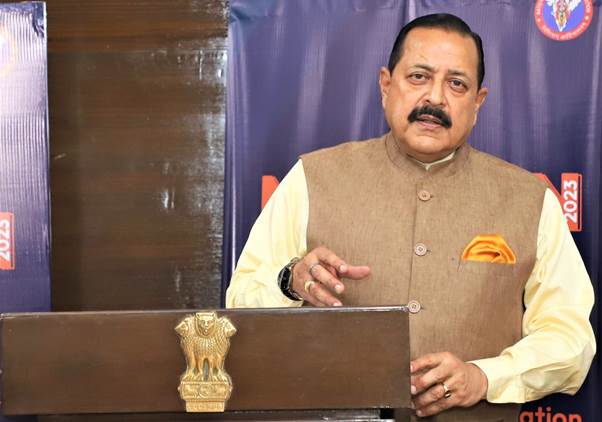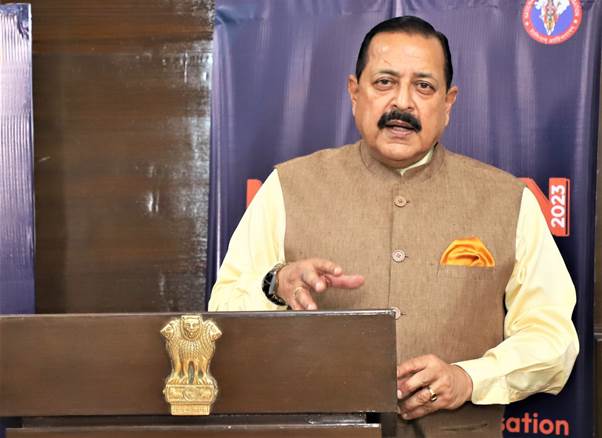
Union Minister of State (Independent Charge) Science & Technology; Minister of State (Independent Charge) Earth Sciences; MoS PMO, Personnel, Public Grievances, Pensions, Atomic Energy and Space, Dr Jitendra Singh today said that the last 9 years have turned India into a cost effective medical destination and this has been possible because of several pathbreaking healthcare reforms and enabling provisions brought in by Prime Minister Shri Narendra Modi ever since he took over in 2014.
Addressing the inaugural session of the 42nd annual conference of National Medicos Organisation (NMO) organised at AIIMS Kalyani, West Bengal by NMO, as chief guest, Dr Jitendra Singh, who is also a renowned Diabetologist and Professor, said that previously India was hardly known for any preventive healthcare but today India is recognised as the vaccination hub of the world. He also said that Medico organisations can collaborate with the government for ensuring last mile delivery of healthcare.

Dr Jitendra Singh said that today we can evidently see that patients from several other countries including Pakistan, Nepal, Bangladesh and even European countries coming over to leading hospitals including government hospitals in India for treatment . All of them have gone back satisfied because the treatment provided to them is world class as India has all the medical facilities available as is present anywhere else in the world and at a much cheaper cost, he said.
Dr Jitendra Singh said that his generation belongs to a generation of medicos who has seen the transition happening in India. The Minister recalled that when he entered into the medical school, his earlier generation had grown in a pre-antibiotic era. With the coming of antibiotics, more or less the communication diseases got conquered. Then new lifestyles diseases started to be more prominent be it diabetes, heart attack, cholesterol along with the increase in lifespan of the average Indian. But the diseases of the old age also got introduced into the large spectrum of diseases confronted by India, he said.
The Minister said that the number of old age people in the country is increasing. Pensioners outnumber the serving employees. Because of this, diseases of the old age are also increasing.
Another big challenge the country is facing today is the diseases of the old age affecting the middle and young age groups. The Minister said that it is pertinent that we address these metabolic disorders because India is moving forward rapidly under the leadership of Prime Minister Shri Narendra Modi and hence we have to protect the potential and energy of our youth, he added. It is in such circumstances that the role of organisations like NMO become important. Lifestyle diseases have social, cultural factors, they are also related to food habits and lifestyle. So because of this, we can’t leave it just to the doctors, everyone has to contribute. Indians have a mixed lifestyle as we are still evolving and trying to modernise, that’s an added challenge as culturally, socially and personally. In this light also collaborations with organisations like NMO gains significance, he said.
Talking about the theme of today’s conference ‘Our health, our nature, our culture’, Dr Jitendra Singh said that it is very much in tune with the requirement of the India of the 21st century. He said that Prime Minister had given us the mantra ‘LiFE’ for environment. Following this vision in the last 9 years under the leadership of the Prime Minister, healthcare has been given top priority by the government.
Dr Jitendra Singh said that during the previous governments, health budget was a very small fraction of the Union Budget. By bringing in Ayushman Bharat, the first of its kind health insurance scheme in the world, India has moved from sectoral and segmented approach of health service delivery to a comprehensive need-based health care service. Further revival of the healthcare system has also been initiated through celebration of International Yoga Day, integrating traditional medicines with allopathy. 2023 is celebrated as the International year of Millets focussing on nutrient rich millets. In the same line India has also given the concept of wellness to the world. It is not just prevention of illness but also promotion of health and wellbeing so that citizens can contribute to nation building with utmost energy and wellbeing, he added.

The Minister said that another important aspect is the integrated healthcare where integration of ayurveda and yoga with modern medical practices is needed. In the past few years, the Government has made a cautious effort to revive our traditional knowledge. In this regard, CSIR has established traditional knowledge digital library where everyone has access to it, not only patent holders so that we have a system of healthcare that has an optimum mix of our traditional knowledge with the most modern discoveries and inventions.
Through Mission Covid Suraksha, Dr Jitendra Singh emphasised that the Government along with the help of like-minded organisations like NMO reached the last mile for conducting the vaccination drive successfully and even providing the indigenously developed vaccines to more than 50 other countries. As a result of this, India was praised globally by the international community for its leadership at the highest levels and its vision to manage the pandemic.
The Minister further said that to prevent lifestyle diseases, in the past few years, the Government has initiated free sugar testing in various hospitals, free dialysis at the district hospital level and developed economical heart stents and medical instruments which are being exported in huge numbers throughout the world.
Talking about National Medicos Organisation, Dr Jitendra Singh said that NMO is a three in one organisation as it is engaged in Swasthya Seva, Samayik Seva and Shiksha Seva at the same time. He said that NMO is an organisation comprising of qualified doctors, qualified students who are contributing to the making of a competitive academic atmosphere as far as medical education in this country is concerned. When Jammu and Kashmir faced devastating floods in 2014, NMO with Sewa Bharati acted promptly by sending not only required material but also 68 doctors from different part of the country for 10 days. Since 2014, Rishi Kashyap Swasthya Sewa Yatra has been regularly conducted with the help of Sewa Bharati, Jammu and Kashmir. This Yatra is aimed to provide health care services and basic awareness to the people in the remote villages of J&K, he said.
Listing out the ways in which organisations like NMO can collaborate with the government, the Minister said that, firstly, organisations can collaborate with StartUps in the medical field who have the right calibre. The Government has also agencies working in this area like the Technology development board, BIRAC etc. Secondly there is a need to collaborate in developing more Indian data for Indian diseases. Organisations like NMO, Seva Bharati can work with government to collect such valuable health data so that we can ensure targeted delivery of healthcare. Thirdly collaboration is needed to ensure integrated healthcare under single roof promoting yoga and ayurveda with allopathy without overlap and malpractice. Finally, Telemedicine which is going to revolutionise the entire mechanism of healthcare delivery in the country requires utmost collaboration, he concluded.
*****
SNC/PK/SM

